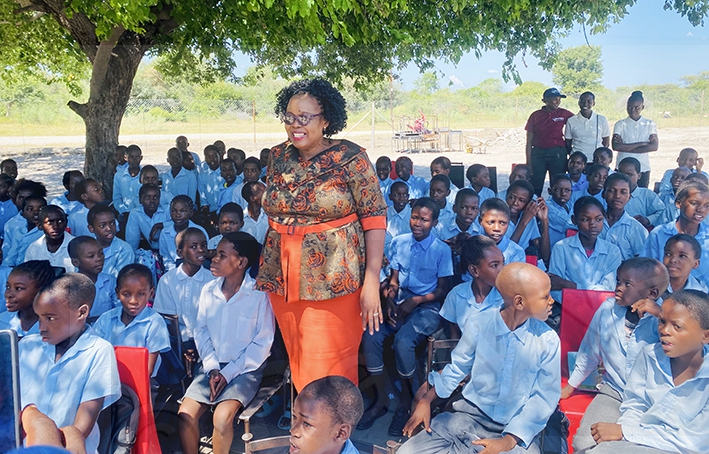Bobirwa farmers forever grateful
22 Sep 2024
At the height of cross-border livestock rustling that spanned over four decades and left many farmers in Bobirwa virtually pauperised, huge chunk of communal grazing land between Mabolwe/Semolale and the cordon fence, which acts as a borderline between Botswana and Zimbabwe, was just barren.
Until the restocking exercise, an intervention by government upon realising that farmers in Bobirwa had lost virtually all their livestock to rustlers following calls for intervention and subsequent presidential commission of inquiry on cross-border livestock rustling, pastoralists who had some of their livestock left, fled the area to try their livestock farming elsewhere, where security was tighter.
Others folded up and retraced their steps back to the village, down and out. They had lost all their livestock to cross-border livestock theft until February this year when government, through Ministry of Agriculture, embarked on a restocking exercise.
But since the restocking exercise, where farmers who lost more than five cattle were compensated with five heads and those who lost five or less received the same number lost, the area is brimming with livestock and owners, who keep a hawk-eye on them. A lesson learnt.
A gesture hugely appreciated.
Prior to restocking, Babirwa who had thoroughly felt the wrath of livestock thieves had already mobilised mephato (traditional regiments) to help augment law enforcement agencies in combating the scourge that brought livestock rearing in the region to its knees.
One Mr Gakegonyatse Mathora was elevated to the position of the head of the mephato and earned himself a title of ‘commander.’
The regiments, together with law enforcement agencies cleared a way for restocking and for farmers to freely tend to their livestock at their preferred cattle posts.
Now, the vast communal area is alive with livestock. The then abandoned boreholes are back pumping water to give life to the animals that hitherto have been a rare sight in the area.
“People are there and are gratefully and happily tending to their livestock without fear,” said Commander Mathora, who also received 25 goats from the exercise. Mr Mathora said 10 of his goats already had 10 kids. He also mentioned that many of the animals across the area had reproduced as well.
Some farmers, reportedly, struggle with managing some of their recently acquired animals. The livestock allegedly evades their sight since they were not accustomed to being followed on a daily basis. In such instances, mephato help trace and report such cattle to owners, Mr Mathora said.
“We would keep the cattle at Mmamatswidi kraal where owners would come and fetch them,” said Mr Mathora who added that farmers respond promptly to their calls for animals that could have strayed off their sight.
He however, noted that livestock owners meticulously took care of their animals as they did not want to revert to their former statuses.
Another of the recipients, Mr Tautona Madema reiterated the thorough care they accorded their livestock.
The 64-year-old who received three Simmentals, a Charolaise and a Tswana beast said his acquired livestock was in good condition and thoroughly taken care of.
“I’m very grateful and happy at the government’s gesture to compensate us with livestock at a time when some of us had resigned to poverty and despair,” said Mr Madema.
He said some farmers who were doubtful about the exercise had been left ruing their choices.
“Some were wondering where the government would get all these animals from while others spat on the whole idea of restocking, saying it would be way too costly for government to undertake,” he said.
Actually, Mr Madema said by restocking, government had done an exercise that was highly unexpected.
“Even the blind could see that government played a huge role in getting us back to our feet in terms of livestock rearing,” he said, adding that a successor to President Dr Mokgweetsi Masisi may find themselves unjustly compared to the latter for his magnanimous acts.
During the restocking exercise, a total of 958 farmers received 180 sheep, 244 receiving 4 890 goats, 616 got 2 827 cattle while 80 farmers received 297 donkeys. In addition, farmers’ clusters received 97 bulls in total.
Cattle selection prioritised heifers between 18 months and three years of age.
At the final handover ceremony of the animals to the recipients, a 63-year-old Ms Christinah Mmanthebe expressed her excitement and relief and lauded government with profuse gratitude at receiving her cattle.
She was issued with the five heifers, some of which could have mated already, after presenting her brand certificate and Omang to confirm her details to the Ministry of agriculture officers.
Ms Mmanthebe told BOPA in a brief interview that she had lost five cattle in 2011 and was extremely delighted to receive the same number of lost animals. She had also lost 25 goats in the process. She had arrived at 7am for 730am, so as not to miss on the package she direly needed. She was amongst the farmers who benefitted from a share of the 546 cattle aimed for restocking in Mabolwe.
The exercise started and was completed at six other villages of Bobonong, Molalatau, Lentswelemoriti/Motlhabaneng, Gobojango, Semolale and Lepokole.
It started with phase one in January, where farmers who opted for small stock and donkeys received their consignments.
Quizzed why she chose five cattle over 25 goats or sheep, which could have been manageable for her considering her age, Ms Mmanthebe expressed her love for cattle and the benefits derived from the same.
“I won’t be a beggar anymore. The good thing with cattle is that they are greatly helpful and valuable,” she said.
Another beneficiary, a 60-year-old Ms Sekebu Madome, who also received five cattle after losing 25 at different intervals from 2016 until 2019, said she was happy to start afresh. ENDS
Source : BOPA
Author : Manowe Motsaathebe
Location : BOBONONG
Event : Development news
Date : 22 Sep 2024





